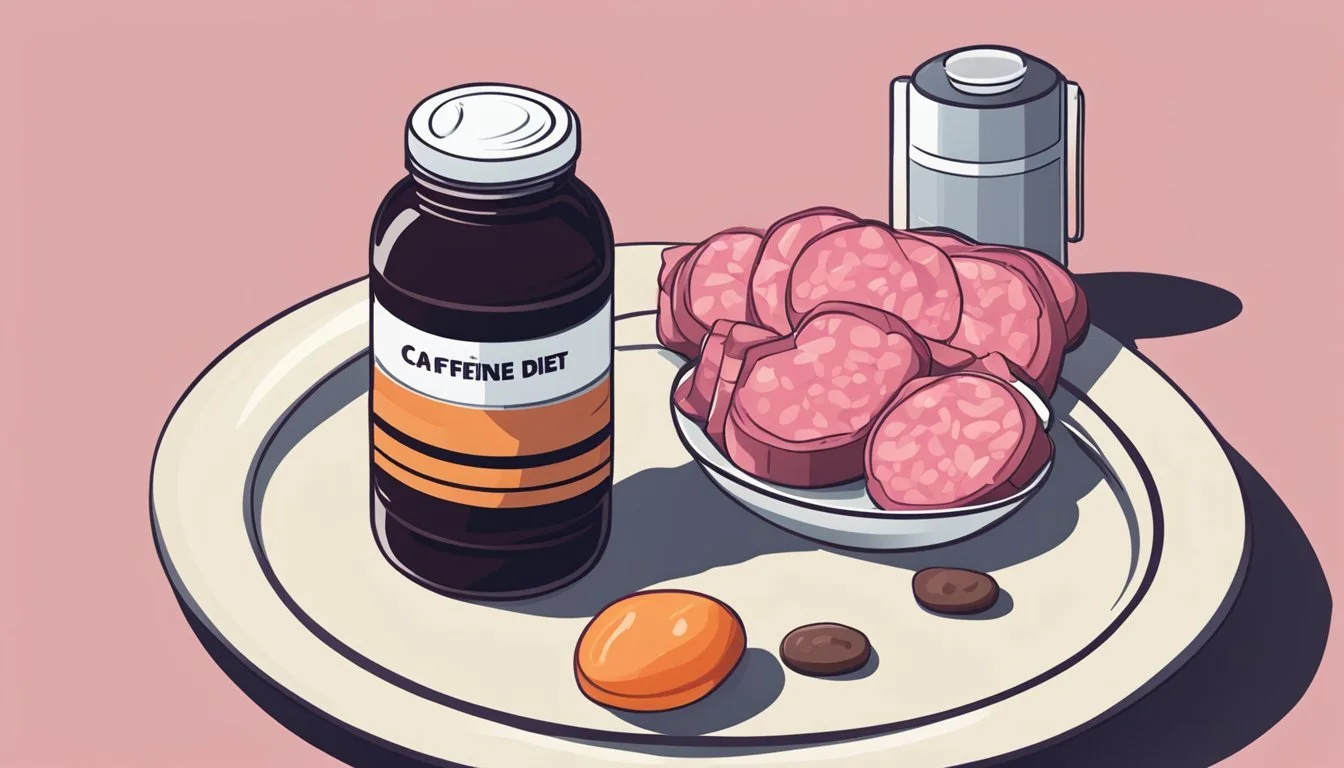Caffeine Pills on Carnivore Diet
Balancing Stimulants with Meat-Only Nutrition
Integrating caffeine into a carnivore diet, particularly in the form of caffeine pills, presents a question worthy of examination. The carnivore diet, which prioritizes the consumption of animal products and eliminates plant-based foods, may lead individuals to seek out caffeine pills as a source of energy and cognitive enhancement without straying from the diet's restrictions. Caffeine, a stimulant, is well-known for its ability to increase alertness and improve mental clarity, which can be beneficial to those adjusting to the carnivore diet's energy fluctuation during the initial phase.
However, the utilization of caffeine pills on a carnivore diet is not without considerations. It's important to account for the potential effects that concentrated caffeine intake can have on the body, such as sleep disruption or increased heart rate, which need to be balanced against the diet's goals. The carnivore diet focuses on high-protein and high-fat consumption, and its followers might find that caffeine pills could either support or hinder their dietary experience.
Moreover, understanding the compatibility of caffeine pills within the framework of a carnivore diet requires a look at both the potential benefits they may offer in terms of metabolism and fat oxidation, and the downsides regarding sleep and cardiovascular effects. Finding the appropriate balance for caffeine pill consumption demands an informed approach that takes into account not only the dietary limitations but also an individual's health and lifestyle requirements.
Understanding the Carnivore Diet
The carnivore diet is characterized by its exclusive focus on animal-based foods and the elimination of plant-based nutrition. This section explores the core concepts and dietary practices within this lifestyle choice.
Fundamentals of Animal-Based Nutrition
The cornerstone of the carnivore diet is the consumption of animal products, which proponents claim can provide all the necessary nutrients for the human body. They emphasize the inclusion of:
Meat: A primary source of protein and essential amino acids.
Organ meats: Highly valued for their nutrient density, including vitamins and minerals.
Eggs: Recognized for their versatility and complete protein profile.
Dairy products: Included by some for their fat and protein content, though often limited to high-fat, low-lactose options.
This diet is posited on the belief that human digestion is best supported by the nutrients found in these food groups, while minimizing or excluding carbohydrates.
Common Foods and Exclusions
Within the carnivore diet, there is a range of foods that are widely accepted, as well as certain exclusions to maintain the diet's strict animal focus. Commonly consumed items include:
Steaks and Ground Beef: Staples for their high protein and fat content.
Poultry and Pork: Diversify the protein intake.
Fish: Especially fatty fish, for omega-3 fatty acids.
Bone Broth: Provides collagen, amino acids, and minerals.
Butter and Cream: Sources of fat and calories without added sugars or carbohydrates.
Conversely, individuals on this diet exclude:
All plant-based foods
High-lactose dairy products
Processed meats with added sugars or fillers
The diet's strict approach to nutrition excludes anything that falls outside the realm of animal-derived products, encompassing a zero-carbohydrate, high-fat, and moderate-to-high protein macronutrient ratio.
Caffeine Pills and Their Role
In the context of a carnivore diet, where consumption is typically limited to animal products, caffeine pills emerge as an alternative to traditional caffeine sources like coffee and tea.
What Are Caffeine Pills?
Caffeine pills are a concentrated form of caffeine and serve as a dietary supplement. These pills provide a controlled dose of caffeine, which can enhance alertness and temporarily ward off drowsiness. They are particularly used by individuals who prefer not to consume caffeine from other sources or who are looking for a more convenient, portable option.
Dose: Often ranging from 100 to 200 milligrams per pill.
Usage: Commonly used to improve mental alertness and combat fatigue.
Comparing Caffeine Pills to Other Sources
Comparing caffeine pills to traditional sources of caffeine unveils distinct differences in consumption and effect:
Coffee: A beloved beverage for its flavor and cultural significance, coffee offers a varying amount of caffeine, typically around 95 mg per cup. It's a natural source that also offers a complexity of taste and warmth, which cannot be replicated by caffeine pills.
Tea: Provides a gentler caffeine boost with added antioxidants. While tea usually contains less caffeine than coffee, it's also consumed for its taste and the experience of drinking it.
Energy Drinks: Typically packed with a higher caffeine content than coffee or tea, energy drinks also contain added sugars and other stimulants, making them less suitable for a carnivore diet focused on clean eating.
Caffeine pills offer a straightforward dose of caffeine without the additional substances found in other sources. They may be suitable for individuals on a carnivore diet who prefer not to ingest plant-based compounds or who desire the convenience and control of a pill form.
Health Considerations
When contemplating the use of caffeine pills on a carnivore diet, individuals should weigh the health benefits against possible side effects. These considerations are particularly crucial due to the absence of plant-based foods in the diet.
Potential Benefits
Alertness and Energy Levels: Caffeine pills can enhance alertness and provide a quick boost in energy levels, which some individuals may find beneficial during the initial transition to a carnivore diet when energy fluctuations are common.
Heart Rate and Blood Pressure: Moderate caffeine intake may improve heart rate and blood pressure. However, these effects are usually short-term and can vary depending on the individual's tolerance to caffeine.
Possible Side Effects
Sleep and Anxiety: Overconsumption of caffeine can lead to insomnia and disrupted sleep patterns. In some individuals, it might exacerbate anxiety disorders, leading to heightened feelings of nervousness and jitters.
Digestive and Heart Health: High doses of caffeine could contribute to digestive issues and may negatively impact heart health over time. The reaction can be more acute in individuals with pre-existing conditions.
Dependency and Withdrawal: Regular intake of caffeine pills can lead to tolerance, requiring higher doses for the same stimulatory effect. Discontinuation may result in withdrawal symptoms such as headaches and fatigue.
Liver Function: Overuse of caffeine might pose a risk to liver health. Safe consumption levels should be adhered to, as the liver processes most of the caffeine ingested.
Nutrition and Supplementation
The carnivore diet is one based almost exclusively on animal products, posing unique challenges and consideration regarding nutrient intake and the role of supplementation, particularly with non-nutrient compounds like caffeine.
Nutrient Intake on Carnivore Diet
On the carnivore diet, one consumes primarily meat, fish, and animal products, which can provide most essential nutrients. Vitamins such as B12 and A are abundant in animal foods, crucial for maintaining good health and supporting organ function. However, individuals may find it challenging to ingest adequate amounts of certain minerals like potassium and magnesium, which are important for electrolyte balance and bone health. Including a variety of meats, such as organ meats, and opting for bone broth can help maintain hydration and provide a source of collagen and antioxidants.
Vitamins: Available in sufficient quantities from animal sources.
Minerals: Potassium and magnesium may require attention.
Electrolytes: Key for hydration, found in bone broth and mineral-rich meats.
Collagen: Supports skin and joint health, available from connective tissues.
While traditional sources of caffeine, such as coffee or tea, are plant-derived and not included in the carnivore diet, individuals may consider alternative forms of caffeine.
Skip the lines and order your potassium and magnesium online for a stress-free shopping experience!
Evaluating Caffeine as a Supplement
Caffeine, a stimulant not present in animal products, is often sought for its alertness-promoting effects. One may argue for the inclusion of caffeine in the diet for its potential benefits on focus and metabolism. Using caffeine pills can be a practical option for individuals on a carnivore diet seeking to incorporate caffeine without breaking from the diet's constraints.
Moderation is key; the use of caffeine should be monitored to avoid adverse effects.
Hydration should be maintained, as caffeine possesses diuretic properties.
The choice to include caffeine pills should be made with consideration to individual tolerance levels and the potential need to balance electrolytes due to caffeine's diuretic effect. It is not a necessary supplement for the diet but rather an optional addition based on personal preference and desired effects on energy and concentration.
Lifestyle and Performance
This section explores how caffeine pills may influence an individual's physical capabilities and mental sharpness, particularly within the framework of a carnivore diet.
Caffeine's Impact on Physical Performance
Caffeine is renowned for its ability to enhance performance. It stimulates the central nervous system, which can lead to increased energy levels and endurance, essential for those leading an active lifestyle. This stimulant effect can prove beneficial for the following aspects of physical performance:
Reaction Time: Caffeine provides a noticeable improvement in reaction times, making individuals more responsive during physical activity.
Strength and Power: Some studies suggest an increase in muscular strength and power as a result of caffeine consumption.
Endurance: By delaying fatigue, caffeine can extend the duration an individual can engage in strenuous activity.
Cognitive Function and Alertness
Caffeine consumption has a pronounced effect on the brain, the following benefits are observed in cognitive functions and mental alertness:
Cognitive function: Enhanced memory, improved problem-solving skills, and more efficient information processing are effects commonly associated with caffeine intake.
Mental Alertness: The ingestion of caffeine pills can combat drowsiness, leading to heightened alertness. This increased vigilance can be especially significant for people following a carnivore diet who may not consume other sources of caffeine.
It is important to note that the benefits of caffeine can vary greatly among individuals and the dose should be tailored to one's own tolerance and health objectives.
Cultural and Historical Context
In examining the cultural and historical context of caffeine pills in relation to the carnivore diet, it's important to consider the prevalent consumption of coffee and tea through the ages and the dietary habits of our ancestors, which were predominantly based on meat and animal fat.
The Rise of Coffee and Tea Consumption
Coffee and tea have a storied history, serving not only as beverages but also as cultural symbols throughout various societies. Coffee, initially discovered in Ethiopia, became a popular drink in the Arab world by the 15th century and spread to Europe in the 17th century, becoming a staple in social settings. By contrast, tea found its origins in China and was being consumed for thousands of years before it became a global commodity. The cultural significance of these beverages cannot be understated; they played central roles in social rituals and were often associated with sophistication and leisure in many cultures.
Historical Carnivore Dietary Patterns
Turning to the historical carnivore dietary patterns, our ancestors relied heavily on meat and animal fat as primary energy sources. This was particularly true in regions where plant foods were less accessible or only available seasonally. Evidence suggests that in certain climates and during specific times of the year, early humans consumed an almost exclusively carnivorous diet. This dietary pattern would have consisted of few, if any, plant-based products like coffee or tea, which were discovered much later in human history.
By understanding these historical and cultural backgrounds, we can better grasp the contemporary discussions about whether or not non-traditional items such as caffeine pills align within the carnivore diet paradigm.
Culinary Practices
When adopting the carnivore diet, individuals must consider how to integrate caffeine and other beverages into their regimen, focusing strictly on animal-based products.
Incorporating Caffeine into Carnivore Diet
For those on the carnivore diet requiring caffeine, options are limited due to the exclusion of plant-based items. Caffeine pills become a viable choice as they offer a pure source of caffeine without additional substances. It is important to note that caffeine itself is not an animal product, but its isolated form in pills does not contain any plant derivatives. For some, dairy products that are low in lactose like heavy cream or butter may be acceptable for a small dash of caffeine when used to lighten coffees or teas, provided they are within the individual's dietary tolerances.
Acceptable caffeine sources:
Plain caffeine pills
Coffee or tea (if tolerated) with limited additions such as heavy cream or ghee
I always prefer buying ghee online because of the added convenience!
Alternative Beverages and Additions
The carnivore diet permits a minimal selection of beverages. Water should be the mainstay of hydration. Bone broth, a nutrient-rich drink made from animal bones, fits well within the diet and can serve as a beneficial supplement.
Water
Bone broth
Potential additives:
Salt (for electrolyte balance)
Collagen peptides (as a supplement in beverages if necessary)
Non-permitted additives:
Plant-derived sweeteners
Flavorings like cinnamon
MCT oil (derived from coconuts, thus plant-based)
One must pay attention to any additives or sweeteners that may violate the diet's strict animal product guideline. Additions like ghee, derived from butter, are generally acceptable to add richness to beverages within the carnivore dietary practice.
Addressing Common Concerns
When exploring the use of caffeine pills within a carnivore diet, it is essential for individuals to discern fact from fiction and have access to reliable information.
Myths and Misconceptions
Myth: Caffeine pills are incompatible with the carnivore diet because they are plant-based. Reality: Caffeine pills can be considered for inclusion in a carnivore diet as they are a concentrated form of caffeine and not sourced from typical plant-based foods like beans, grains, or fruits.
Myth: The carnivore diet provides all necessary nutrients, eliminating the need for any supplementation. Reality: While the carnivore diet is rich in certain nutrients from animal products, individuals may choose caffeine pills for their stimulatory effects, particularly if they choose to avoid other caffeine sources such as coffee or tea.
Frequently Asked Questions (FAQs)
Are caffeine pills derived from plant toxins? Caffeine pills are synthesized and do not contain the plant toxins that some individuals on a carnivore diet may be concerned about, such as those found in legumes or seeds.
Do caffeine pills contain carbs, sugars, or other non-carnivore diet components? Quality caffeine pills are generally free from carbs, sugars, spices, and other elements that are not part of a carnivore diet, focusing solely on delivering caffeine to the body.
Can incorporating caffeine pills impact the consumption of plant-based foods? Individuals on a carnivore diet aim to avoid plant-based foods altogether. The use of caffeine pills does not directly promote the consumption of vegetables, grains, or fruits, adhering to the diet's principles.
What about the plant-based nature of coffee and tea? Coffee and tea are plant-derived and typically excluded from a strict carnivore diet. Those looking to stay strictly animal-based with their diet may opt for caffeine pills as an alternative to these beverages.
Caffeine Regulation and Balance
When adopting a carnivore diet for its potential health benefits, individuals may still seek to include caffeine. It is crucial to manage its consumption and understand the body's response to ensure that the benefits outweigh the risks associated with caffeine.
Moderation and Dosage
The key to incorporating caffeine into a carnivore diet is moderation. One should adhere to the recommended limit of 400 milligrams of caffeine per day, which is about four 8-ounce cups of coffee. Through moderation, individuals can mitigate the risk of negative side effects, such as jitteriness or heart palpitations.
Tolerance: The body may develop a tolerance to caffeine, necessitating higher doses to achieve the same effects, which can lead to increased risk of side effects.
Side Effects: Overconsumption may result in insomnia, digestive issues, or increased heart rate.
Managing Withdrawal and Dependency
Dependency on caffeine can develop with regular use, and its sudden removal can lead to withdrawal symptoms. They should understand the symptoms of caffeine withdrawal to successfully manage them.
Withdrawal Symptoms: May include headaches, fatigue, and irritability.
Transition Strategies:
Gradual reduction in caffeine intake.
Replacing caffeinated beverages with non-caffeinated alternatives like bone broth or water.
Individuals should be aware of the signs of dependency and strive to prevent it by limiting their caffeine intake to the body's tolerable thresholds. Adjusting to a caffeine-free or caffeine-reduced lifestyle on a carnivore diet may require a period of adaptation for the body.
Impact on Chronic Conditions
The carnivore diet and caffeine pill usage may influence chronic conditions, particularly concerning heart health and mental well-being. It is imperative to consider the potential effects on these aspects to manage health risks effectively.
Caffeine and Heart Health
Caffeine can have a stimulating effect on the cardiovascular system. Regular intake of caffeine pills can lead to increased heart rate and potentially elevate blood pressure, which are critical markers of heart health. While moderate caffeine consumption might be tolerable for healthy individuals, those with existing heart conditions should exercise caution. Research suggests that:
High doses of caffeine (over 400 mg per day) can significantly impact heart rhythm, leading to palpitations or arrhythmias.
People with type 2 diabetes might experience adverse cardiovascular effects since caffeine can impair glucose metabolism, thereby necessitating careful monitoring of their caffeine intake.
Effects on Mental Health
The carnivore diet alone eliminates various food sources that can affect mental health; adding caffeine pills into the mix can further alter the landscape. Caffeine has been observed to have both positive and negative effects on mental health:
Some studies indicate caffeine can enhance alertness and provide a short-term boost to mental clarity. This might assist individuals in managing symptoms of Parkinson's by temporarily augmenting cognitive function.
Conversely, excessive caffeine consumption may exacerbate symptoms of anxiety and depression, heightening one's risk of developing or worsening these conditions, particularly in sensitive individuals.
Future Trends and Research
As the carnivore diet gains more attention, both emerging studies and the development of new dietary supplements are shaping the future outlook on caffeine consumption within this dietary framework.
Emerging Studies on Caffeine and Carnivore Diet
Researchers are continually exploring the effects of caffeine within the context of a carnivore diet. The primary focus is on whether caffeine can disrupt or enhance the health benefits purported by the diet. Given the all-meat nature of the carnivore diet, early studies are examining how caffeine might affect nutrient absorption and metabolism. Future research aims to provide a clearer understanding of how caffeine pills interact with the body when plant-based fibers and carbohydrates are minimal.
Innovations in Dietary Supplements
The dietary supplement industry is responding to the carnivore community's needs by innovating products that complement the diet's nutritional profile. New caffeine supplements are being developed to support the higher fat metabolism that comes with a carnivore diet. They may also focus on how to offer energy benefits without potential negative impacts on gut health and inflammation that some users of the diet report. Advances in supplement formulation take into account the purity and source of the caffeine, ensuring that these products align with the animal-based food ethos of the carnivore diet.
Scientific studies and consumer feedback are guiding these innovations, with the goal of maximizing health benefits while maintaining the diet's principles.















